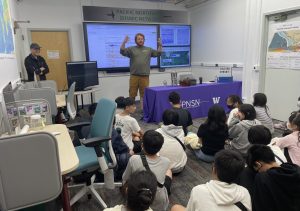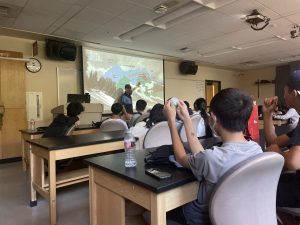Students from the Taipei Municipal Lanya Junior High School ended an international learning experience at the Department of Earth and Space Sciences with a tour of the Pacific Northwest Seismic Network. This trip was part of an international project funded by the Department of Education of the Taipei City Government in Taiwan. This international visit aims to:
- Broaden student vision and establish leadership skills;
- Gain experience in international/cross-cultural communications and promote the importance of diversity and inclusion;
- Build connections with peers in the US, by visiting Hosford & Harriet Tubman middle schools in Portland, OR;
- Learn about the global trend of technology development, research focuses, and potential career paths through visits to top tech companies (Matician, Google) and research universities (Stanford University and UW) along the west coast.
Doug Gibbons, PNSN Field Engineer & Seismology Lab Coordinator, gave a brief overview of the science behind what causes earthquakes, and talked about the PNSN Seismology Lab and how seismologists locate earthquakes and measure their impact.
In an exciting demonstration, students can see how movement, such as bending your knees, stomping, and jumping, are picked up by a seismometer in the room and shown on a monitor. The demo was a big hit and the students were laughing and smiling while stomping around. They were very engaged and asked great questions afterwards including, “is there a way to stop earthquakes?” and “can other planets have earthquakes?”

ESS Postdoctoral Scholar Larry Syu-Heng Lai, who hosted the group during their UW visit, gave a presentation to the students introducing the Department, Earth Sciences in general, and his personal research, as well as a discussion about life as a foreign researcher in the US.

After the visit, Lai reflected, “Looking at them, I feel that I am so OLD! This event gives me a chance to share the things and words I would have told my younger self. These smart kids have a lot of potential with bright futures. It’s great to share with them that Earth Science is fun, and the knowledge, global mindset, and skillsets learned from this field are super useful, applicable, and transferrable to many other fields.”
Lai obtained his B.Sc. and M.Sc. in Geosciences from the National Taiwan University, and his PhD from the University of Oregon, devoting his early career on basin analysis and landscape evolution research in the Coastal Range of eastern Taiwan, an active arc-continent collision orogenic system.
“I am honored to have this opportunity to share my path in studying abroad, working in an alien country, facing challenges of cultural difference and language barrier. Having a chance in connecting and communicating with diverse people in the United States is a very different, precious, and eye-opening experience, which is still true for me today.”